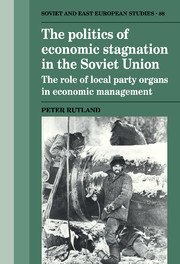 The Politics of Economic Stagnation in the Soviet Union
The Politics of Economic Stagnation in the Soviet Union Book contents
- Frontmatter
- Contents
- List of tables
- Preface
- Glossary of Russian terms and abbreviation
- Introduction: The party in the post-totalitarian system
- 1 The party and the economy: structures and principles
- 2 Party interventions in industry
- 3 Interventions in industry: case studies
- 4 The party as regional coordinator
- 5 Regional coordination: case studies
- 6 The party as fireman: party interventions in the transport and energy sectors
- 7 The role of the party in agriculture
- 8 Non-party control organs
- 9 The principles underlying the party's work with cadres
- 10 The obkom elite in the 1980s
- 11 Party and economy under perestroika
- Conclusion Party and economy in the USSR: from stagnation to collapse
- Appendices
- Notes
- Bibliography
- Index
- THE POLITICS OF ECONOMIC STAGNATION IN THE SOVIET UNION
3 - Interventions in industry: case studies
Published online by Cambridge University Press: 06 July 2010
- Frontmatter
- Contents
- List of tables
- Preface
- Glossary of Russian terms and abbreviation
- Introduction: The party in the post-totalitarian system
- 1 The party and the economy: structures and principles
- 2 Party interventions in industry
- 3 Interventions in industry: case studies
- 4 The party as regional coordinator
- 5 Regional coordination: case studies
- 6 The party as fireman: party interventions in the transport and energy sectors
- 7 The role of the party in agriculture
- 8 Non-party control organs
- 9 The principles underlying the party's work with cadres
- 10 The obkom elite in the 1980s
- 11 Party and economy under perestroika
- Conclusion Party and economy in the USSR: from stagnation to collapse
- Appendices
- Notes
- Bibliography
- Index
- THE POLITICS OF ECONOMIC STAGNATION IN THE SOVIET UNION
Summary
This chapter examines three areas of routine industrial activity where party organs showed a high level of involvement – the problem areas of supply procurement, quality control and conservation. Taken together, these three areas accounted for the vast bulk of routine party interventions in industrial decision-making.
All three types of activity were interrelated in that they were all responses to the entrenched tendency of the planned economy to run on the basis of the maximum achievement of quantitative plan targets. The tension which planners imposed on factories meant that the slightest perturbation in performance could cause breakdowns in the chain of supplies, and the pressure to achieve output targets meant that suppliers cut corners on quality and paid scant regard to the question of conservation.
From the 1960s onwards repeated efforts were made to expand the set of plan indicators governing managerial behaviour. These attempts proved unsuccessful, and planning by volume of production remained the standard procedure for Soviet industry. Deteriorating economic performance in the late 1970s left planners with even less room for manoeuvre. Party organs were encouraged to step into these areas of supplies and quality control, to try to break through the bureaucratic inertia of planners and managers. These political interventions into the routine functioning of Soviet industry produced some positive results at the margin, but did nothing to correct the structural flaws of the Soviet economy.
- Type
- Chapter
- Information
- The Politics of Economic Stagnation in the Soviet UnionThe Role of Local Party Organs in Economic Management, pp. 73 - 90Publisher: Cambridge University PressPrint publication year: 1992


